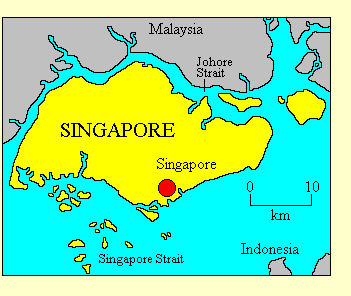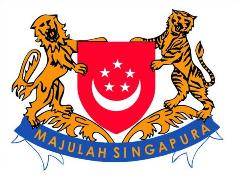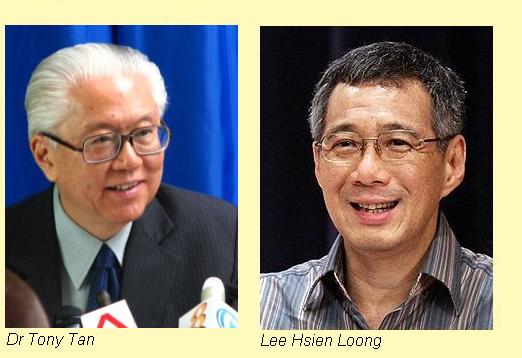

REPUBLIC OF SINGAPORE
• Official name: Xinjiapo Gongheguo / Republic of Singapore / Repablik Singapura / Singapur Kutiyarasu
• Location: South East Asia
• International organisations: Asia-Pacific Economic Co-operation Forum, Association of South East
Asian Nations, Commonwealth of Nations, Non-Aligned Movement, United Nations, World Trade
Organisation
• Borders: None (Singapore is linked by Malaysia by a causeway.)
• Coastline: Johore Strait, Singapore Strait
• Land area: 693 Km2
• Population: 5,000,000
• Annual GDP (PPP) per capita: US$50,300 (2009 CIA estimate). World ranking: 6. On this ranking Singapore
is the richest country in Asia.
• Ethnicity: Chinese 76.7%, Malay 14%, Indian 7.9%, other 1.4%.
• Languages: Chinese, Malay, Tamil and English all have "national language" status, but in practice
English is the official language and the language of business and communications. Actual spoken first
languages are: Hokkien 25.4%, Hakka 15.1%, Teochew 13.0%, Yue 9.7%, Mandarin (Guoyu) 5.8%, Hainan 4.2%,
Min Dong 1% (Total Chinese languages 76.4%), Malay 11.4%, English 6.5%, Tamil 3.2%, Bengali, Japanese,
Javanese, Malayalam, Punjabi, Sinhala, all less than 1%.
• Religion: The majority of the population are at least nominal adherents of the traditional Chinese
mixture of Buddhism, Taoism and Confucianism. There is a substantial Christian minority. Most of the
Malays are Sunni Moslems, while a majority of the Indian community are Hindus.
• Form of government: Parliamentary republic.
• Capital: Singapore
• Constitution: The
Constitution of the Republic of Singapore came into effect on 3 June 1959. It was amended on
independence in 1965.
• Head of state: The President, elected by direct universal suffrage for a six-year term.
The President's functions are largely ceremonial. President
Tony Tan Keng Yam took office on 1
September 2011.
• Head of government: The Prime Minister, appointed by the President. the Prime Minister is the
leader of the largest party in the legislature and is accountable to it.
• Legislature: Singapore has a unicameral legislature, the
Parliament of Singapore, which has 93 members elected for five-year terms. Of these, 84 are elected from a mixture of single-member and non-proportional multi-member constituencies, and nine are appointed by the President.
• Electoral authority: The Elections Department of the Singapore Government administers national elections.
• Freedom House 2009 rating: Political Rights 5, Civil Liberties 4
Political history
The port of Singapore was founded in 1819 by Sir Stamford Raffles, Lieutenant-Governor of
Bencoolen, as a dependency of British India. The island had previously belonged to the Sultan of
Johore. By the 19th century most of its population was Chinese, although Indians, Malayans and
Indonesians were also attracted to the busy port. There was no constitutional development in Singpore
before its occupation by the Japanese in February 1942.

After the war pressure for self-government grew, especially from the labour movement. An
elected Legislative Council was introduced in 1948, and full self-government followed in 1955. In 1959
Lee Kwan Yew's People's Action Party, then a socialist party,
won government and has remained in power ever since. In 1961 Singapore, with its Chinese majority,
rather reluctantly agreed to become part of the federation of Malaysia, but in August 1965 it
peacefully withdrew and became an independent republic.
Under Lee's long prime ministership, Singapore enjoyed spectacular growth and a large degree
of social harmony despite its complex ethnic mix. The PAP has long shed its socialist ideology and has
provided efficient and corruption-free government. It has also created what is in effect a one-party
state, with an electoral system designed to keep opposition parties out of Parliament, a tame press
and draconian laws restricting political activity and opinion. Lee retired in 1990 and was succeeded
first by Goh Chok Tong and then by his son
Lee Hsien Loong.
The only opposition party represented in the Parliament is the
Workers' Party of Singapore. Other parties include the
Singapore People's Party and the
Singapore Democratic Party. There is no chance that
these parties can defeat the PAP, or even form an effective opposition. It is something of a mystery
why the PAP, which rightly boasts that it has made Singapore into a "first-world" country, and would
certainly win a free election on merit, feels the need to go on ruling like a third-world dictatorship.
The 2011 election saw a significant fall in the PAP vote, and the Workers Party won a multi-member seat for
the first time, giving the opposition an unprecedented six seats. At presidential elections in September, the
government candidate, Dr Tony Tan, was elected by only a narrow margin over an independent candidate. These were
seen as signs that the PAP's long-unchallenged hold on Singapore politics may be weakening.
Freedom House's 2009
report on Singapore
says: "Singapore is not an electoral democracy. The country is governed through a parliamentary
system, and elections are free from irregularities and vote rigging, but the ruling PAP dominates the
political process. The prime minister retains control over the Elections Department, and the country
lacks a structurally independent election authority. Opposition campaigns are hamstrung by a ban on
political films and television programs, the threat of libel suits, strict regulations on political
associations, and the PAP's influence on the media and the courts... Singapore has traditionally been
lauded for its relative lack of corruption... Singapore was ranked 4 out of 180 countries surveyed in
Transparency International's 2008 Corruption Perceptions Index... Singapore's media market remains
tightly constrained. All newspapers, radio stations, and television channels are owned by
government-linked companies... The Societies Act restricts freedom of association by requiring most
organizations of more than 10 people to register with the government, and only registered parties and
associations may engage in organized political activity. Public assemblies of more than five people and
all political speeches must be approved by police... The government's overwhelming success in court
cases raises questions about judicial independence, particularly because lawsuits against opposition
politicians and parties often drive them into bankruptcy."
Updated September 2011
|
